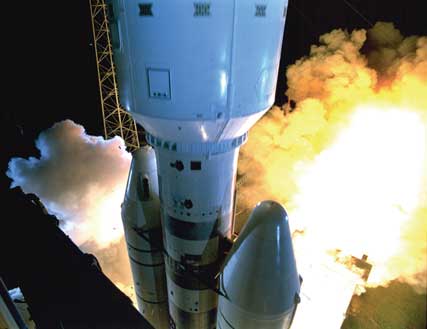AEROSPACE INDUSTRY REVIEW

|
| A rocket development deal involving Boeing, Lockheed Martin and the U.S. government will boost Denver's aerospace employment by 1,000 highly skilled workers. |
Mile-High City Sets Sights on Even Higher Goals
"A mile closer to space" is how Colorado's economic developers describe their unique geographical position in the aerospace industry.
In and around the capital city of Denver, it seems that everywhere you turn there is evidence of a rapidly growing space-based economy.
In suburban Aurora, Northrop Grumman announced Sept. 21 that it will build a 75,000-sq.-ft. (6,968-sq.-m.) facility at its existing campus and hire an additional 350 workers at an average annual wage of $80,000. A $1-billion Pentagon contract could spawn an additional 2,000 Northrop Grumman jobs in Colorado Springs.
The Los Angeles-based defense contractor announced that the entire Pentagon contract could reach $2.5 billion over 10 years.
According to the Aurora Economic Development Council, the company received an incentive package of nearly $1.4 million, including city waivers of sales and use taxes and an Arapahoe County waiver of personal property taxes.
At nearly the same time, airplane manufacturer Aviation Technology Group (ATG) announced that it had selected Metro Denver as the site for its manufacturing operations. The company will employ 150 highly skilled workers at a 56,000-sq.-ft. (5,202-sq.-m.) plant at the Front Range Airport in suburban Adams County. The employees will build up to 1,800 high-speed, high-performance jets priced at $2.8 million to $5.5 million each for both military and civilian clients.
Earlier this year, the Boeing Co. and Lockheed Martin announced that a joint venture to build a new generation of rockets for the U.S. government would involve the relocation of 1,000 workers to the Metro Denver area.
"We feel that Metro Denver benefits the most from this joint venture," said Tom Clark, executive vice president of the Metro Denver Economic Development Corp. "While the rocket manufacturing component will go to Alabama, Metro Denver will attract the top-level engineers currently working on Boeing's Delta program."
Expansions like these fuel Metro Denver's and Colorado's ascent up the charts of the top aerospace states in America. Colorado ranks fourth in the nation in total space economy employment, with more than 142,000 jobs.
With a 50-year history in the space program, the state now has more than 300 firms engaged in space work, including the five largest NASA contractors in the nation. Experts predict that, by 2010, Colorado will employ more than 232,000 people in space-related work.
In addition to being the home of three major space bases, Colorado is considered to be the nation's geospatial imaging capital. Two of the nation's three leading satellite imaging companies are headquartered in Colorado, and the state is a national leader in space education and training. The state is home to the Air Force Academy and Colorado University, which receives more NASA funding than any other public university in the U.S.
The Metro Denver market serves as the hub for Colorado's space industry; the metro area ranks second out of the 50 largest metros in the U.S. for aerospace industry employment.
- Ron Starner

